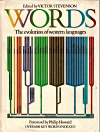

| Book of the Month | ||
 |
Words - the evolution of western languages |  |
Publisher: Metheun, New York
Editor: Victor Stevenson
US$25.25 (approx)
ISBN 0-458-96920-6
They say 'a picture is worth a thousand words'. So, okay - how do you say that idea with a picture? Words are an important part of being human, and every language student at some time wonders how a particular word came to mean what it does. Learning the origin of words is not just a matter of curiosity, it also helps you to understand and learn vocabulary, and it teaches you how to understand words you have never seen before. This book takes the reader on a journey of thousands of years and shows how the family of western languages developed over the ages. Along the way we learn (for example) that 'lox' (smoked salmon in the USA) comes from 'lachs' which is 'salmon' in German and is linked to a language in Chinese Turkestan which has the same word for 'fish'.This book is about all modern European languages, but in learning about them, we also learn much about English, which is the main focus.
There are ten chapters in the 222-page book, which starts in the distant past with 'Vanished voices' - a study of the now-extinct languages which gave many words to modern English. From there we look at Greek (which gave us everything from 'atom' to 'cosmos'), Celtic, the Romance languages (including Latin, French, Spanish, Italian and Romanian), and then we move north to take in Germanic, Slavonic and the Baltic languages. All of these languages have contributed, and are still contributing, words and phrases to English. There are sub-chapters which look at linguistic groups which do not seem to fit anywhere - such as Hungarian and Basque. We also learn that words such as 'donate' and 'scientist' were considered 'barbarous Americanisms' when they first appeared in England. (And incidentally, that famous expression 'it is raining cats and dogs' comes from 19th century Canada.)While some of the illustrations are interesting, whole-page pictures of (for instance) Greek-speaking villagers do not add a great deal, except probably to the price of the book. The book finishes with a glossary which is nine words long, and therefore useless, and an index and recommended further reading which are useful.
Who is this book for? The style of the book is very academic, and will best suit either a college or university student. EFL and English teachers will find the book useful because it gives the origins of many of the words they teach, and some interesting facts that can be produced at the same time - for example that 'admiral' comes from Arabic, via Spain. This is one of many books which is worth considering because it does not just teach English, it teaches us about English. However, the dry and serious tone will put many readers off, while academics will not see the point of the often irrelevant illustrations.
Verdict: For Serious academics
Assessment 5/10